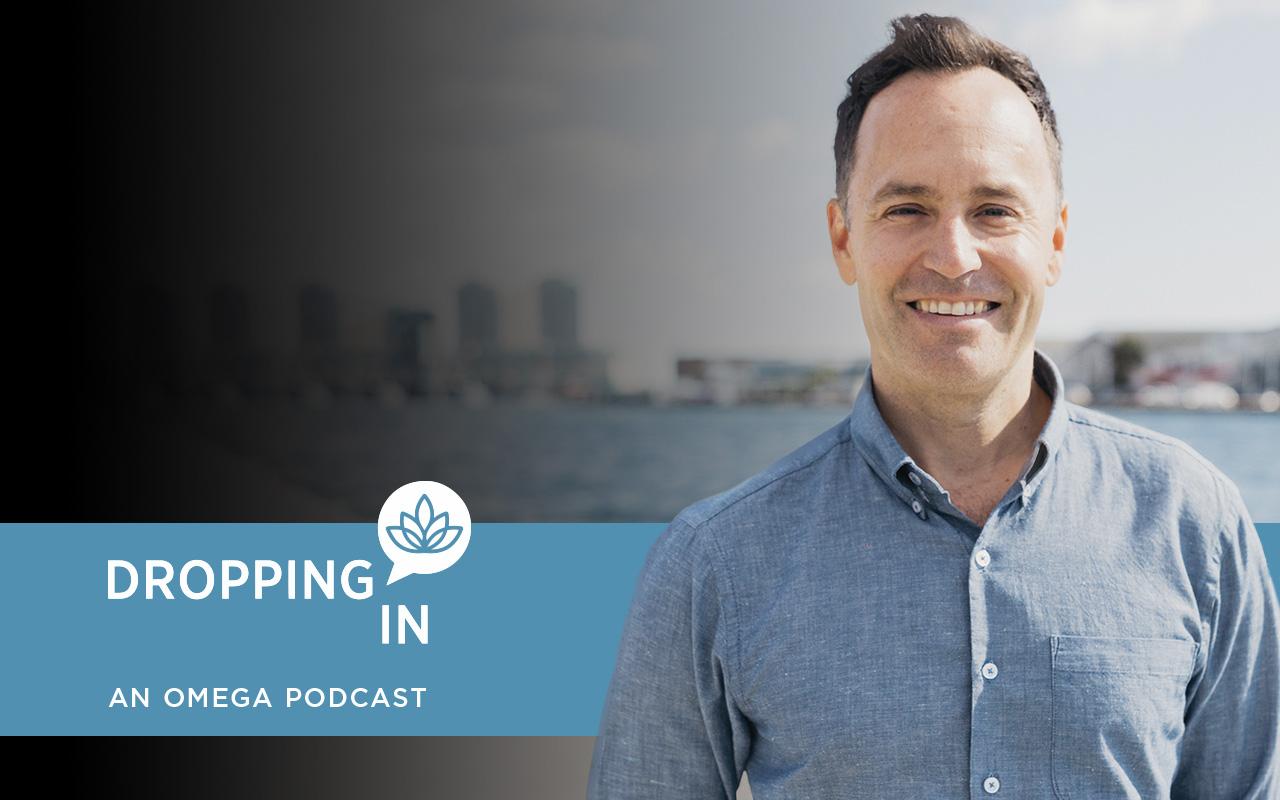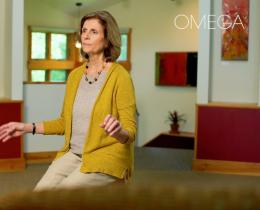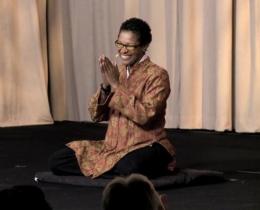Cali Alpert:
Welcome to Dropping In from Omega Institute, a podcast that explores the many ways to awaken the best in the human spirit. I'm Cali Alpert. Dropping into our Omega Studio today, Jeff Warren. Jeff is a meditation teacher, journalist and author of the Head Trip, a travel guide to sleeping, dreaming and waking. He's also co-author of the New York Times bestseller, Meditation for Fidgety Skeptics, which he says mark the start of speaking openly in public about his own mental health challenges.
Cali Alpert:
Jeff's honest, down to earth and sometimes irreverent exploration of meditation has made him one of the most accessible experts in the field, with popular content on apps like Calm and 10% Happier. Welcome, Jeff. Thank you for dropping in today on Omega's Rhinebeck, New York Campus. I'm so happy to see you.
Jeff Warren:
I'm happy to meet you, Cali. Thanks for having me.
Cali Alpert:
Pleasure. Thank you for making the time. What is your practice? Here you are, we're at the Omega campus. What's your practice when you're here at Omega campus and did you have one this morning?
Jeff Warren:
So I did not do my formal sitting practice this morning. Actually, I often don't do a formal sitting practice. I probably get, if I'm honest, maybe two of those in a week. It depends on the week-
Cali Alpert:
Quite interesting.
Jeff Warren:
Quite a bit. But in terms of half an hour set aside deliberately to get very quiet and seated. That said, I continuously think about practice and connect to practice-like instructions throughout the day. My whole point for me is to deliberate practice and meditation from the cushion, to kind of bring it out in every in different ways. I do lots of other practices through the day. I'll do movement practices, where I'm really cultivating the same skills. Once a week, I meet with a trauma therapist, which is really important for me and it's the same skills that are being cultivated there.
Jeff Warren:
I have a voice coach I work with, which has been a tremendous adventure into my mind and body that turns out to be the same skills and all kinds of insights get generated from there and on and on and on. I mix a lot of practices into my day. I do think there's a place for simple seated practice and stillness. There's something that happens there that is very important, which we can unpack.
Jeff Warren:
But there's a lot of mixing up. My new thing is Feldenkrais. I'm doing this training to be a Feldenkrais teacher which is all about kind of movement and meditation, getting very, very, very still inside and noticing the sort of freedom available, I guess you could say in each moment to move in a slightly different way to slightly repattern the nervous system. I'm finding it just this incredible experience, these trainings. I'm doing quite a bit of that right now too. That's an answer to your question.
Cali Alpert:
Interesting.
Jeff Warren:
Yeah.
Cali Alpert:
Going back to the voice coach, is that intended for your professional life or to get more in touch with your voice in sort of a metaphoric and literal way?
Jeff Warren:
Well, all the above. It started out as something that Calm proposed. I do a lot of meditations for the apps now, for 10% Happier and for Calm. My voice was getting kind of burned out after two and a half hours. I was getting a vocal fry they call it, like this, when you're talking like this.
Cali Alpert:
As it happens when you do meditation, it's sort of funny.
Jeff Warren:
Yeah, yeah. Which are ironic, I'm guiding meditations and I'm getting. But of course, guiding meditations. That's a whole subject, how to guide meditations in studio. I love it. But anyway, I was getting... My voice was getting sort of strained and they suggested, "Hey, why don't you see this voice coach that can give you some tips?"
Jeff Warren:
So I met this wonderful woman, Deborah Joy, who's based in Toronto where I am. And she's also a Kundalini teacher, she's so many things. In this exploration of my voice, I can't even tell you the amount of insights and learning I've had. For one, I don't actually even... I often don't speak in my normal range. I speak deliberately a little lower without knowing I'm doing that because something about how I was brought up, having too high or light a voice, something was weak about that. Who knows what it was?
Jeff Warren:
So I've internalized this way of relating to the... And when I'm in that lower voice, I tend to be in a more explanatory mode as opposed to a more second circle genuine connecting vibe. She showed me this. It's become this whole... And then rediscovering my love of singing. We sing together and make sounds together and we explore the range. And it's just become this whole exploratory practice into who I am, my whole being. And that's kind of my thing, is that anything can be that.
Jeff Warren:
Interviewing people, looking at you across the table, you doing what you do is an entire deep practice of exploring who you are. And the way you approach that, it reveals different dimensions. It can itself be a transformative practice. This ended up being a good way into talking about things I'm passionate about.
Cali Alpert:
Yeah. No, that's really beautiful and interesting. Already bags so many questions, I'm just offshoots out of everything that you just said. But describing sort of the pastiche of all the different things that you find mindfulness inside of, I love the idea and I do know that you represent this and also you speak... You really are such a master at contemporizing and mainstreaming for lack of a better word, making more accessible the concept of meditation. These are all versions of mindfulness that most of us aren't thinking about every day that you can really find it in everything.
Jeff Warren:
Yeah. I'd always understood the idea of kind of mindfulness in action and of course, understood the idea that there are many wayfinders and paths in. But my teacher for a long time was Shinzen Young, still someone who's very important to me. He has a particular way of talking about mindfulness, which has been very revealing for me.
Jeff Warren:
That is just really seeing it as this, he describes for him, it's a sort of a three-part attentional skill set, that it's a cultivation of concentration, of clarity and of equanimity. Understanding those component parts, understanding how they show up in our moment to moment experience, what they are, how they deepen over time, that to me was sort of the skeleton key because then I could see how those qualities show up in different ratio in different practices. You can see how they live in prayer practices, how they live in movement practices or how they live in artistic practices.
Jeff Warren:
Each of those three and there's not just the three, of course, there's lots of ways to break this down and other skills, but you can see how the medicine of each of those three works. And I think of it often as like... That's one of the things I do in my teachers when I teach in large groups is, I kind of start by putting up on the board in front of... I get a bunch of paint and I paint four colors. Red is for care. That's the care piece and yellow is for clarity and green is for equanimity and blue is for concentration.
Jeff Warren:
This is our color palette. These are the basic building blocks out of which every practice is built among other things. They're there in different ratios. How we can begin to kind of paint our own experience, we can begin to shape our own experience with that as our palette. And then that becomes... When you really understand that, as you're going about your day to day, it's less am I meditating, for me, it's more okay. Oh, I can see right now, for example, I'm getting really excited. There will be a tendency in me to just keep rambling and rambling on and just hurl unheeding over whatever sensitive interesting questions you're about to launch into.
Jeff Warren:
But instead, I have the skill of equanimity. So it's like okay, I can kind back off from that energy that wants to surge forward. I can make this little adjustment. I can choose to tune in, I can choose to tune into your face, that little concentration adjustment and see what I'm noticing there. I could get kind of clear on the details. I can let it show me something. I can start to infuse the moment with more care. These become the levels, the mixing board, whatever your metaphor, there's infinite metaphors for managing your experience, moment to moment and going more deeply ultimately into your experience of your life.
Cali Alpert:
Is there such a thing as hyper mindfulness in the moment?
Jeff Warren:
Yeah.
Cali Alpert:
Because I hear all the nuances of what you're describing when you're practiced and you're a practitioner and an expert for lack of a better word in the idea of mindfulness and meditation and you're always able to notice and catch yourself and find that space. Is there such a thing as hyper mindfulness?
Jeff Warren:
Like it going too far?
Cali Alpert:
Yeah. Or where you can be interruptive.
Jeff Warren:
Yeah. Well-
Cali Alpert:
I don't know.
Jeff Warren:
No, no, it's a really interesting idea. There's actually a bunch of things that come out of that, thinking about that. What I would... Maybe the first thing that comes to mind is there is certainly a period in living the examined life and becoming more mindful where it actually creates a sort of heightened self consciousness where it's almost like you... Because you have a "meditator" or a mindful person watching you all the time and so it can... That's a sort of temp... That's a kind of halfway house where there's a period of needing to kind of see that, of seeing the over vigilance, if you will.
Jeff Warren:
I think that's kind of part of growth in a mindfulness understanding. I would also say there are particular... Each of those skills can be really dialed up to degrees that are quite interesting and I don't think fully necessary. For example, the mindfulness piece, the hyper clarity, the sensory clarity like my teacher Shinzen and the paths in the world, that path to liberation or to more freedom or whatever you want to call it is a path of ratcheting up to sensory clarity.
Jeff Warren:
It's about seeing in moment to moment, fundamental emptiness, seeing the rising and falling of things and then seeing what's empty underneath it. That is very profound. It's also kind of a boutique thing. It's not necessarily for everyone. It's one kind of temperament that's going to be drawn into that and it's one form way in which we can start to see something more fundamental in life. But it also can be a little bit, maybe not, maybe more than a little bit disregulating. I found it to be disregulating.
Jeff Warren:
I was a super hardcore practitioner. I was gunning for all the classic attainments in a [inaudible 00:11:28] mode. And all the models, teacher models I had around me were these very masculine, analytic, sort of vaguely autistic temperaments. That was what I thought practice was and it ended up being fairly disregulating for me. I had to kind of change how I approached it.
Jeff Warren:
I have a lot of dysregulated energies. I have a bipolar diagnosis and ADD diagnosis. I'm kind of like a volatile nervous system. You have to learn to make adjustments in your practice based on what you're bringing to the table and what's coming up, as you obviously know because you interview people way smarter than me about this.
Cali Alpert:
No, I'm here to hear it from you right now. So I appreciate everything that you're saying. Speaking about what you said earlier about all the different ways that we can find mindfulness meditative moments in a certain type of practice in ways that we're typically not thinking about and how that so much of what your work is about, do you think that that helps to appeal to a different demographic and contingent of meditators to take away sort of the austerity and the mysticism and all the kind of ancient wisdom words that are often associated with meditation?
Jeff Warren:
Yes.
Cali Alpert:
How important is that?
Jeff Warren:
I think it's really important for this time and I think having a fun approach, having a deliberately pluralistic approach and I'll be honest, I'll say the words, this is an ADD generation, this is an ADD time. Attention has never been pulled in so many directions, it's never been more challenged, I myself have that diagnosis. It's a challenge I work with. I recognize the path I've just described is fundamentally an ADD outlook on practice.
Jeff Warren:
There are downsides to that or there are things that you need to be mindful of about that and there are advantages to that. And so knowing what those are is important. The obvious downside is you end up in a kind of endless consumer mentality of just shopping for practices and never committing to anything. That is definitely something that can happen.
Jeff Warren:
I think for me the way around that is first of all, understanding like I just articulated that there are common skills that we're always training in a way. Those skills themselves become your vertical path and even if you have a fairly widespread. Another thing is just some people aren't temperamentally... Some people hear, they find out about a path, they find out about a teacher, they find out about a technique and it's so obviously the right match for them. That pluralistic mode is a way for them to find that. Otherwise, they have some thing in their head about how practice needs to look. It's whatever it is that they've encountered, it has to be like you were describing, this austere thing sitting on a cushion and only working with the breath or only working in this modality and it doesn't speak to them.
Cali Alpert:
Right. Mountaintops and ashrams beautiful things, but it's not necessary to learn and to take on these practices.
Jeff Warren:
And mental health. The mental health situation today is way too urgent. People need practices. Practices... Creative practice is preventative mental health. So we have to help people find their way into what works for them based on who they are and what's around them. I think having a kind of playful pluralistic presentation of practice up top is how it's going to appeal to that generation. Not just that generation, lots of people. My generation, Gen Xers.
Cali Alpert:
So important, so important. You'd said something, I'm not sure if... Let's see if I read it or if I heard it. There was a reference that I found in researching you that you believe that meditation may be one of the most radical things we humans can do, take on. I wonder why you believe that. If you think that the world would be a kinder, gentler, more secure place, if more, if not everybody in our fantasy minds meditated.
Jeff Warren:
I absolutely believe that. Although I would say, by meditation, I mean really practice. I mean having that, being committed to some kind of practice and living a more conscious life in that way and trying to apply the skills that you're learning. It's the most radical act because it is re-mixing your experience of reality, of self and world, what is more radical than that. Practice shows you the fundamental plasticity of our models of self and world and how we can begin to... We don't have to just take everything...
Jeff Warren:
We don't have to just... Whatever challenges we're presented with, we don't have to let ourselves stay in that place. We can get traction on it. We can change, we can transform, we can heal and we can use our own suffering and our own exploration that way to help others do the same thing. It's the most radical reconfiguring of a life. It's incredibly empowering. It's fundamentally creative.
Jeff Warren:
You can transform your life according to what matters to you. According to your values, you can... This isn't just... I don't mean this in some kind of rhetorical way. You really can change how you're experiencing things. I've changed how I've experienced things. If I look at how I am now, there's so much less suffering in my experience now than there was and there's... I have such a different view or understanding of things. I just think I would want that for everyone. And so the question is how to get folks into that mindset, away from the kind of battled way of thinking about it which is bad, to put that in quotes, but it's like, "Oh." You get to be...
Jeff Warren:
Mental health is not something you need to think about. You're kind of [inaudible 00:17:45] coast, unless there's a real emergency and then you've got to go to a professional and ask for help. Which is a really different way to think about it than... I think a healthier way to think about it is this is this basic creative project that... It's something we have to always be conscious of. Practice is the very thing that will support us in that.
Cali Alpert:
When you see creative, it sounds really we're talking about the creation of our lives as sort of this piece of clay that we're perpetually sculpting.
Jeff Warren:
Exactly. The creation of our lives and the spread of love and caring out to every other life. Because I think the most important thing that you communicate as a guide, it may be in part for sure, this idea of getting still, beginning to trust yourself. But for me, as important as that, is this idea that your life is yours to find your creative practice that you...
Jeff Warren:
I teach these how-to guide workshops and it's about ostensibly how to guide people in meditation, how to guide people in practice, but really what it is, is how to show in the guiding, how this practice that you've chosen is perfectly suited to you and the healing you need and you can do that too. Let me take you into my healing. I'll share this thing with you and then make something for yourself and share that with somebody else. It's sending it out. It's casting out the seeds and thinking of it as these creative projects that we can pass around and put into each other's nervous systems inside. It's like... It just gives me chills.
Cali Alpert:
Especially given the intention of what you're expressing which is just to create more of a sense of community and tribe and humanity and collectivity and all the things that are really our deepest, most primal desire anyway that we just continue to forget. We get so far away from it.
Jeff Warren:
Exactly.
Cali Alpert:
I think what you're expressing is such a beautiful reminder of these practices and modalities are all so simple or at least the intention is so simple. We've done such a good job of complicating and moving away from what our true essence is. That's a topic that forever astounds and confounds me.
Jeff Warren:
Yeah.
Cali Alpert:
Now we've gotten so good at that.
Jeff Warren:
Well, it was very well said.
Cali Alpert:
Let's talk about what meditation and practice really do. Physiologically, barebones for someone who's never considered it, thinking about it, afraid of it, curious, intimidated, barebones, what does it do?
Jeff Warren:
Well, I wrote a book about the brain and I've been interested in what changes in the brain but I think actually, a much more direct way to talk about it is to talk about experience. What it does in experience is it helps you get out of your own way. You make things deliberately simple. It takes a while. It can take a while for things to settle.
Jeff Warren:
But as the thinking mind, the mind, that's always making problems, the mind that's in the future and in the past and which is this beautiful thing that we dance with in our life. But as that begins to quiet, we see there are fewer problems. It really is that simple in a way. The experience is of a kind of settling, a kind of coming back into our bodies, back into the moment, realizing that there's actually more space in this moment than we realized. And therefore, we have more autonomy to make the choices, the responses that make most sense for this situation.
Jeff Warren:
In the body, it's on all these ways that the practice down-regulates all the fight, subtle fight, flight in the nervous system. You're continually amazed at how much... There's always more of you that can rest. You sit down on a cushion and you think you're relaxed on the cushion, but actually, you're really uptight. So you've got to pick up your butt. You're kind of holding yourself off the cushion. You don't even realize it. It's like, "Oh!" And then you see this layer of tension in your face, the sternness and the layers come off. It's layer by layer and ever more light, ever more available, ever more free and spontaneous.
Cali Alpert:
It's beautiful. I'd love to talk a little bit more about that idea of space and witnessing. Because, again, that's what probably every practice ultimately intends to do. Can you speak to the significance of finding that space a little bit more deeply and being able to become a witness to your own life versus being caught. Because again, that's our natural tendency is to be in the reactivity and the responses and the fight or flight and whatever dramas and narratives are constantly playing out versus being able to just take a minute and realize the space and finding that well of equanimity. It's a very powerful and beautiful thing. Can you speak a little bit more to that? Especially when people are first starting to find it so they can relate to what we're talking about.
Jeff Warren:
Well, it's the whole magic of mindfulness. It's this... You don't even realize all the trances that you are in at the beginning. How could you? You've never had another perspective outside, although you've had breaks from it. That's when you were feeling good or you had the ease. So you start to practice and you just... Inevitably, right away, you're caught up in something.
Jeff Warren:
It's that first moment of noticing, "Oh, I'm caught up in this thing." You start by, "Oh, I'm actually..." The obvious way it shows up is you have an intention to sit and you want to just sit and say, "Follow your breath." But it's sort of like... The way I describe it is it's like you were there with the breath, but then it was like this whale, underwater whale, sort of rows up and swallowed you up. And you were swimming along the water and you don't even realize that the whale has swallowed you and you floated off and you're in this bubble of your own thinking, you're in this whole other environment, and it's this immersive larval state of being in your thinking.
Jeff Warren:
And then you realize, "Oh, my God! I thought I was supposed to be here meditate but I'm completely somewhere else." And you notice that. That's the action. It's no more exotic than that. You have this capacity at any moment to pop back into a broader perspective. Not just in a seated practice. A good journaling practice will teach you the same thing. A good discussion with a skilled therapist will teach you the same thing. There are many ways to generate insight.
Jeff Warren:
It's the human capacity to realize that we've been motoring along in a particular assumption or a particular mood and to pan out and notice that. I guess what is so interesting for me is that the space just keeps on going. It's not... There's always another thing to see. Not to like set up a kind of thing in your mind or I've always got to do more because part of realizing is that you don't need to do more, you can come to a complete sense of space in the moment that's total. There's nothing more to happen in that moment. You're there. But over the course of your life, over the course of living, new layers will accrete. So there is a place for that examined life of being continually curious about what unconscious things you're inside without realizing it.
Cali Alpert:
I'd like to hear a little bit more about your story. You mentioned your bipolar diagnosis, your ADHD. When you were a younger lad, I know there were some sorted or more hedonistic parts of your life that maybe felt like they precluded you from being as centered as you wanted to feel.
Jeff Warren:
You could say that.
Cali Alpert:
I'd rather hear you say it. What is it that first launched your... Even just your awareness or kick in the butt that maybe I need a little something here, a little help something to balance me out.
Jeff Warren:
God! My whole life was a giant blinking marquee to that effect. I was always interested in spiritual practice without knowing that's what I was doing. Like laying on my bed when I was a kid and trying to visualize infinity or having lucid dreams or trying to teleport a ham sandwich up from the kitchen. That was there but then I kind of had a challenging youth. I was unhappy kid you know, I had a lot of suffering for some reason. It wasn't because my parents treated me badly or just came in the world that way.
Jeff Warren:
I kind of went into a tranquilize myself mode from about 17 to 32 maybe. Not exclusively, but where I just was really a big partier and I did a lot of damage to myself both from all the addictive behaviors, but just the reckless insane things I did in breaking... I broke my neck and I broke my shoulders and I've smashed... I got beat up by Hells Angels and I got... I flipped in the bed of a pickup trucks and... I have had like eight near death experiences or something, most of it altered.
Jeff Warren:
So I started to get... Obviously, you have your... I'm still partying and doing all this stuff. But then I started to get interested in what was going on in my mind. After I broke my neck, my consciousness was quite different. I became a lot more ADD, more attentionally volatile. I couldn't organize my thoughts the same way. At McGill, I was a literature major and I just... Schoolwork got harder. I got interested in what was going on in my consciousness and I started reading books about consciousness in the brain.
Jeff Warren:
Of course anyone who starts to get really obsessed with consciousness, what you don't... It's almost always just like the secular way of saying you're a seeker, you don't know it. I had no language of spirituality. But I was interested in my being and these philosophical questions. I think I started Yoga as a way to get into my injuries. That kind of opened me up to doing meditation. I started doing that. And then it all just kind of went from there. Writing the Head Trip, a book about consciousness and I had a chapter on meditation. So I was doing a lot of reading about practice then. I'd been doing a lot of non-dual practices before that and I started sitting.
Jeff Warren:
Of course, that's when everything... I started really to see the medicine of what meditation can do. But all the while I'm still struggling with my... See, this is the thing. I often felt like meditation was meant for some kind of super regulated person. Like, I'd be sitting there like... This is obviously not meant for someone who's ADHD because I can't sit still, because I can't... I have trouble focusing on one thing. Once I got really interested in it, I could hyper focus, then I could get really deep into practice. It's kind of part of the temperament. But right away from the beginning, I was like, "Well, how do I make these practices work for me with this different kind of nervous system?"
Jeff Warren:
In the background, there was this mood volatility, which I didn't know... I didn't really make anything up. You just think that's what normal is. But that was another thing that I'd be... I would go into these practices and I would go really deep and suddenly, all these crazy energy, kind of Kundalini stuff would come up and I get really dysregulated. I go into these hypomanic states for days. All I ever got for my teachers was, "Oh, just noticed that's happening. Keep meditating."
Jeff Warren:
It was just like more equanimity, which is not what I needed. I needed trauma work. I needed other tools for regulating myself. I had to figure all this stuff out on my own. That's why I teach what I teach. I teach a path of having to kind of figure it out on your own and looking at being interested in other modalities and getting help from community.
Jeff Warren:
There's this other paradox here because the practices... There's two things, you're accepting who you are and how you are, your weird nervous system. You've got to accept that you have those energies in you, you have this volatile attention. In the accepting, in applying the different practices, you can begin to work with those energies, you can begin to be more regulated, you can begin... Even if you're ADHD, even if you're bipolar and of course there are other, there are meds as options or other things, those didn't work for me.
Jeff Warren:
But there are... So there's both a sense in which you can begin to address some of those things and you're owning that you are those things, you're honoring them, you have the neuro diversity piece of knowing that those are gifts, that's part of the movement that's happening now around mental health. It's like, "Yeah. Damn right, I have this." Not, "I am that," because you're nothing. You start to realize that with practice.
Jeff Warren:
This is a visitor for me. This is a beautiful visitor, to teach me all these things and it has these particular challenges, yes. But the more you totally blindly self identify with always being that way, the more that story will determine you. There is a way in which you also have to learn that you're bigger than any of these diagnoses, if you want to put it that way. I think that was a pretty ADHD answer to your question. Hopefully I got it, some of it.
Cali Alpert:
I think that was a comprehensive answer.
Jeff Warren:
Okay.
Cali Alpert:
Like I said earlier, you really are masterful at grounding the nuts and bolts of meditation and practice in a way that I really appreciate. Yeah, it really helps in a relatability kind of way and I think there's a reason that so many people resonate with you because you've taken away the woo.
Jeff Warren:
Well, I just sit up there and act like a weirdo. People feel better about themselves when they see someone acting so crazy.
Cali Alpert:
Well, there's relatability and when you're a teacher and you're relatability, which takes us to the next question and when it comes to broadening the availability and democratizing the idea of practice and mental health, I know that this is really important to you. Can you tell me why?
Jeff Warren:
Because we all need to not be alone. We'll, we're all in this together and community is a main thing of how I got through it and I want that for other people, whatever it means for them. To me when I think about democratizing mental health, what I mean is making practice more accessible to every kind of person and making support structures because it's not just about practice. It's about those support structures. That's why I founded the Conscious Explorers Club.
Jeff Warren:
The heart of what we do there as a nonprofit is it's not just that we have a global community now and we do our free teachings on Monday nights and we do all our offerings, we also... What it has the potential to be even more is a hub for community practice. I wrote something called the community practice activation kit. That's really about encouraging people wherever they are to start their own little practice groups that reflect what the values and what's important in that local community.
Jeff Warren:
It won't look anything like what the conscious Explorers Club looks like. That's the point, get together with a group of friends, do a practice, guide each other, talk about what the experience was like. Sharing about your mental health challenges, talking about your experience is itself a transformative and healing practice. Just that, coming together with a common cause, the realizing that you're not in this alone, everyone here, we're all up against the same thing.
Jeff Warren:
It's such a diverse community, we have psychotherapists and healers and body workers and neurologists and meditation teachers and yoga teachers and movement teachers. We're kind of the ideas that we're almost like a repository of other ways to get support. That's what I imagine of these communities that come together, but you also understand when there may be needs for something else, when someone needs more support and here are the connections that can make that happen. That's sort of the idea, the ideas.
Cali Alpert:
The need for community can never be overstated.
Jeff Warren:
No.
Cali Alpert:
People are so hungry for it. Again, it's like our basic inherent desire and yet, it's still something that we need to practice and work on to create.
Jeff Warren:
Definitely. It's healing also because I always say the community is the teacher. I'll prepare a whole thing for a weekend thing I'm doing, teaching. I almost always... It just gets tossed out the window. Because the second I asked somebody to talk about their experience, all of a sudden, the teaching's happening over there. They're just being real about something they're struggling with and all these other people can relate. And if that person had never said that, they never would have noticed it. That's another way we get insight about ourselves is to hear other people talk about it. The community's the teacher for real. That's not a platitude. It really is... That's where it comes from.
Cali Alpert:
I was struck by this as I was going through your activation kit and the little animation, very sweet little animation that you created with a story of the organization. I was thinking that's such an important... I related to it so much, it's such an important piece. No one is too inexperienced to be a teacher.
Jeff Warren:
That's key. I think the world needs more amateur teachers. And I put teachers in quote because I don't know what another word is, another way of saying just human beings willing to be real and vulnerable with each other and to guide each other in a practice. To me, the potential danger of amateurs guiding each other, which we can say something about, if there is a... It's possible someone can get dysregulated and there's trauma informed pieces that I put into my guidance and my teachings for sure. But that danger is so much smaller than the danger of not having a practice at all and the danger of being left alone in your mental health struggle with nothing to hold on to.
Jeff Warren:
I feel for those because I was that person for a long time. For me, it's about taking the teacher off the pedestal down into the community in this place where we're guiding each other. The thing is, when you are real and honest about where you're at, you are in... You're transmitting the deepest teaching you can transmit. There is no teaching that is deeper than that, than being exactly honest and present with who you are and articulating and guiding from that place. That is a teacher.
Cali Alpert:
Beautiful. Finally, I have three questions. Three more rapid fire questions I like to ask every guest on Dropping In. The first one is I'd like to grant you one wish for our listeners, what would it be?
Jeff Warren:
If I could give my listeners anything?
Cali Alpert:
One wish.
Jeff Warren:
I would say to find the creative practice that just sings in the nervous system, to know what that is, what that song is. I would want that for everyone and there may be many.
Cali Alpert:
What is something you wish for yourself?
Jeff Warren:
Same thing. I wish I could know, but I can't, that my son will never become estranged for me, my two-year-old, which is the weirdest thing to worry about. But I'm a human being and I'm a parent, I love him so much and I just see that estrangement and alienation that happens in all families. I worry about it, even though I know all I can do is just be present and loving... And they'll never be a guarantee. But if I could have anything, I would want that. I guess I would want to know that I don't need to worry about that and somehow have come into an understanding about that. That's a vulnerable piece but that's true.
Cali Alpert:
I appreciate your candor. It's powerful. What's the most important offering or tip you'd like our listeners to take away from our conversation today?
Jeff Warren:
They're the teacher.
Cali Alpert:
The silence is so powerful after that. I'll have to end with the silence because it really is so loud and there's so much poignancy in that so thank you for that.
Cali Alpert:
Number one, thank you for joining today. And for spending the time and for your insights and the powerful and beautiful work that you do.
Jeff Warren:
My pleasure.
Cali Alpert:
If our listeners would like to learn more about you, buy your books, hear your meditations, where can they find you?
Jeff Warren:
Well, the Consciousness Explorers Club, my nonprofit that is really... There's a group of us, Aaron Oak and James Maskalyk and Avi Craimer and Kevin Lacroix and all my friends, that website is cecmeditate. So you can get the community activation kit there, there's lots of free resources. And then my website is jeffwarren.org. Lots of free meditations there, all kinds of stuff.
Jeff Warren:
I have this section called Steal These Meditation Ideas. It's just hundreds of meditations in there that I've guided that people can listen to if they're interested. And then I have also... On Sunday night, I do the Do Nothing project, so it's a free broadcast to whoever wants to join in. It's live. Eight o'clock, I just appear. Wherever I am, I'll do one here at Omega.
Jeff Warren:
Usually, there's some tech problem and it's a kind of disaster. But it's real and then a guided practice and people chat and it's just a wonderful resource and community. It's the way in which I've kept sane through the pandemic. So that would be placed to if people wanted to connect, they could go there. Yeah.
Cali Alpert:
Thank you so much.
Jeff Warren:
You're welcome Cali.
Cali Alpert:
Thanks for dropping in with Omega Institute. If you like what you hear, tell your friends and leave us a review on Apple Podcasts. It helps new ears find us. Dropping In is made possible in part by the support of Omega members.
Cali Alpert:
To learn more, visit eomega.org/membership and checkout are many online learning opportunities featuring your favorite teachers and thought leaders at eomega.org/online learning. I'm Cali Alpert, producer and host of Dropping In. The music and mix are by Scott Mueller. Thanks for dropping in.







